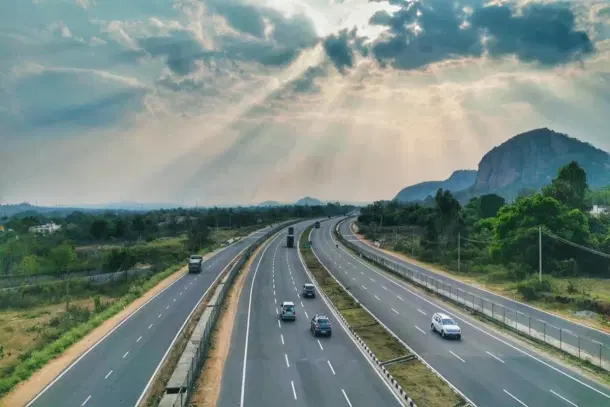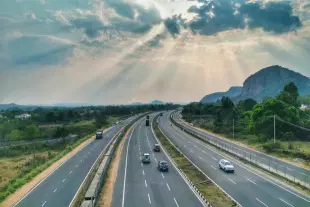Infrastructure
Karnataka Cabinet Approves Loan Plan For Rs 27000 Crore Bengaluru Business Corridor Project
V Bhagya Subhashini
Sep 09, 2024, 01:21 PM | Updated 01:52 PM IST
Save & read from anywhere!
Bookmark stories for easy access on any device or the Swarajya app.


In a key development, the Karnataka state cabinet recently approved securing long-term loans for the Bengaluru Business Corridor project, formerly known as the Peripheral Ring Road (PRR).
This decision follows two failed international tenders, prompting the state government to move forward independently.
The project will be executed by the newly formed Bengaluru Business Corridor Ltd. (BBCL), which is expected to be led by a senior bureaucrat after Deputy Chief Minister DK Shivakumar stepped down from the role.
The government has approved the hiring of 69 temporary personnel, including land acquisition officers, tahsildars, civil engineers, and surveyors, to expedite the project.
The Bengaluru Development Authority (BDA) has allocated 1,950 acres for the project, with land acquisition costs potentially surpassing Rs 20,000 crore.
State Law and Parliamentary Affairs Minister HK Patil, speaking after the latest cabinet meeting, stated that loans will cover 75 per cent of the total project cost, however, specific details regarding the overall project cost and the exact loan amount have not been disclosed.
Under the plan, the state government will guarantee the loans secured from financial institutions. The repayment method for loan interest remains flexible, with options including allocations from the state budget or payments by the BDA.
The cabinet has identified several financial institutions, including REC Ltd., Power Finance Corporation, and Housing and Urban Development Corporation (HUDCO), to provide funding. Additionally, state-owned enterprises with surplus resources will contribute capital to the project.
Compensation for landowners affected by the project will follow the guidelines of the Right to Fair Compensation and Transparency in Land Acquisition, Rehabilitation, and Resettlement Act, 2013.
However, a distinct compensation package — separate from the provisions of the 2013 Act — will be offered, which is a key demand from landowners. The cabinet has also approved offering compensation through Transferable Development Rights (TDR) for those who choose to accept it voluntarily, reports Hindustan Times.
A notable decision is that the Bengaluru development minister will not be the chairman of the newly created Special Purpose Vehicle (SPV), Bengaluru Business Corridor Ltd., though a replacement for the role is yet to be named.
The government has also approved acquiring land extending up to 100 metres along the PRR. Fifty metres will be allocated for a six-lane main carriageway, similar to NICE Road and the Bengaluru-Mysuru access-controlled highway. The remaining 50 metres will be used for mixed development, with plans for commercial, residential, and non-residential buildings. The development will include provisions for increased Floor Area Ratio (FAR) and relaxed setback requirements.
The PRR is designed to reduce traffic congestion and improve connectivity around the city’s periphery. It will pass through 10 major junctions and over 100 minor intersections. The plan includes 16 flyovers at strategic points such as Hesarghatta Road, Old Madras Road, Whitefield Road, Channasandra Road, and Hosur Road, among others.
When the project was first approved in 2007, the estimated cost was Rs 5,800 crore, including land acquisition. This figure was revised to Rs 11,950 crore in 2016, with the formation of a special purpose vehicle (SPV) to manage the project.
This ambitious project is set to feature 16 flyovers, 10 overpasses, and 12 underpasses, enhancing the city's transportation network. Additionally, the plan includes bridges over seven water bodies, including prominent ones like Chikkatogur Lake, Gunjur Lake, and Jarakabande Lake, further facilitating seamless connectivity.
To tackle traffic intricacies, the project incorporates six cloverleaf-type over bridges, providing a solution for efficient crisscrossing without congestion.
The main carriageway, boasting eight lanes, will be flanked by service roads on both sides, with a broad median reserved for possible future integration with the metro project.
The project covers 65.95 km between Hosur Road and Tumakuru Road, with an additional 3.4 km near Madanayakanahalli and 4.08 km near Hebbagodi to link existing roads seamlessly into the PRR network.
V Bhagya Subhashini is a staff writer at Swarajya. She tracks infrastructure developments.




